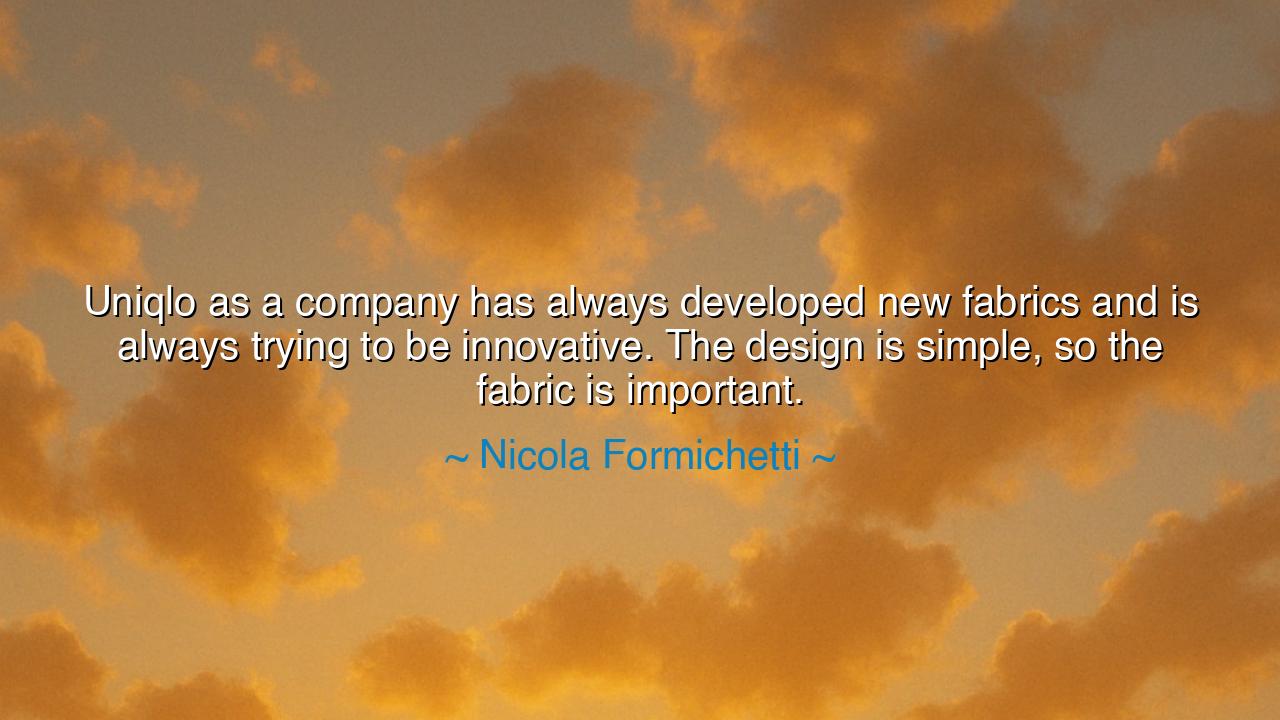
Uniqlo as a company has always developed new fabrics and is
Uniqlo as a company has always developed new fabrics and is always trying to be innovative. The design is simple, so the fabric is important.






Hearken, O children of craft and cloth, and attend to the words of Nicola Formichetti, the visionary of fashion and design, who reflected: “Uniqlo as a company has always developed new fabrics and is always trying to be innovative. The design is simple, so the fabric is important.” In these words lies a meditation upon the unity of simplicity, material, and innovation. True design, Formichetti teaches, is not merely in form or ornamentation—it is in the careful selection and mastery of the substance, the fabric, through which simplicity achieves its fullest expression.
Since the dawn of human adornment, mortals have understood that materials are the foundation of creation. The weavers of Egypt, the tailors of Rome, and the silk artisans of ancient China knew that the quality and innovation of fabric determine the strength, beauty, and resonance of the garment. Formichetti’s insight echoes this eternal principle: simplicity in design is amplified by innovation in material, and the unseen qualities of substance give life to even the most minimalist form.
Consider the story of Issey Miyake, the Japanese designer who revolutionized pleating techniques and introduced fabrics that transformed the interaction between body and cloth. His designs, though simple in silhouette, achieved extraordinary expression and movement because of the ingenuity embedded in the material. Similarly, Uniqlo’s dedication to developing new fabrics ensures that simple garments become functional, comfortable, and transformative, proving that material innovation elevates minimalist design into enduring art.
The essence of Formichetti’s teaching lies in balance. Simplicity alone, without substance, is empty; innovation alone, without clarity of form, is chaotic. By focusing on fabric, Uniqlo demonstrates that material is not secondary but central, that the feel, durability, and adaptability of the garment are as essential as its aesthetic form. Simplicity becomes meaningful when anchored in substance, and design achieves authenticity when paired with thoughtful innovation.
In another sense, Formichetti’s insight teaches patience and foresight. Creating new fabrics demands research, experimentation, and dedication. Innovation is often invisible to the eye, yet it shapes the wearer’s experience profoundly. Consider the woolen mills of Scotland or the cotton innovations of Lancashire—these advancements, painstaking and meticulous, laid the foundation for garments that served both function and elegance for generations. Likewise, Uniqlo’s approach illustrates that behind every simple design lies profound craftsmanship and ingenuity.
O seeker, take this teaching into your own life: in every endeavor, attend to the foundation, the substance, and the materials that give form to your work. Innovation is not only in visible flourish, but in the unseen qualities that shape experience and impact. Just as a minimalist design relies on fabric, so too do every action, creation, or effort rely upon integrity, preparation, and thoughtful execution.
Moreover, understand that simplicity is a canvas, not a limitation. Formichetti reminds us that restraint in form demands excellence in material, just as silence in speech demands precision in meaning. By valuing the fabric, the essence, and the substance, creators elevate their work, allowing it to resonate, endure, and inspire. True artistry is the harmony between clarity of vision and depth of foundation.
Thus, Nicola Formichetti’s words endure as both guidance and meditation: embrace simplicity, innovate in substance, and honor the material that gives life to your creation. Let every endeavor reflect thoughtful foundations, clarity of form, and the hidden ingenuity that transforms the ordinary into the extraordinary. In this union lies both mastery and timeless beauty.
If you wish, I can also craft a short illustrative story showing a designer or company transforming simple designs through innovative fabrics, making Formichetti’s philosophy vividly tangible for listeners. Would you like me to do that?






AAdministratorAdministrator
Welcome, honored guests. Please leave a comment, we will respond soon